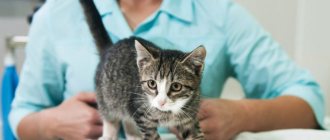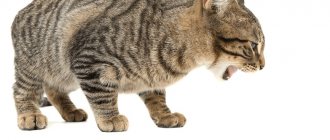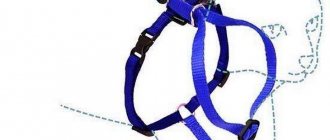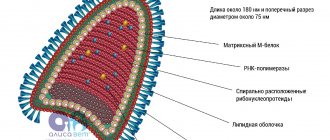If you decide to have a kitten as a pet, you should be aware that, in addition to great joy, it is also a huge responsibility.
A caring owner carefully monitors the health of his pet and takes all preventive measures to ensure that the animal is maximally protected from contracting various infections. The following are used as preventive methods to combat infectious diseases:
- vaccination of animals;
- avoiding contact with street cats;
- excluding the presence of an unvaccinated animal on the street;
- maintaining careful hygiene of the premises.
Vaccination of cats is a method that provides a high percentage of guarantee that your animal will not become infected with a serious disease, or, if infected, the disease will be easier and without complications.
What is a vaccination (vaccine)
This is an injection that is:
- Serum obtained from the blood of animals that have immunity.
- A vaccine containing neutralized (weakened) live pathogens of an infectious disease that stimulate the body to actively develop immunity.
High-quality drugs from reputable manufacturers are manufactured in strict accordance with established standards. They must be stored and transported in a strictly defined manner. All these precautions can only be observed by specialists. Such drugs do not harm the animal and provide reliable protection against pathogenic agents.
How are kittens vaccinated?
In veterinary medicine, kittens are vaccinated against pathogenic viruses and bacteria with live and non-live vaccines. Live ones, according to experts, contribute to quick and effective protection against infection, but may be accompanied by complications. Non-live vaccines are extremely rarely accompanied by allergic reactions, but are characterized by a longer period of antibody production.
Vaccinations are also divided into monovalent and complex. Monovalent vaccines protect against one infection, while a complex vaccine includes several types of virus. All biological products are subject to mandatory certification.
For rabies
The following rabies vaccinations are used in veterinary practice:
- Rabikan. A domestic drug with a standard revaccination period of once a year.
- Rabizin is a monovalent rabies vaccine.
- Nobivac Rabies is a popular, high-quality drug from a Dutch manufacturer.
In addition to monovalent vaccines, cats can also be protected from the rabies virus using complex medications. For example, Quadricat not only serves as a preventive measure against rabies, but also prevents infections such as panleukopenia, calcivirosis and viral herpes.
From the plague
The following medications will help protect your pet from panleukopenia:
- Nobivac Tricat Trio. One of the best live vaccines against plague, rhinotracheitis and calcivirus infection.
- Multifel-4. A domestic drug designed to protect your pet from rhinotracheitis, calcivirosis, distemper and chlamydia.
- Feo-O-vax. American analogue of Multifel-4.
- The quadricate also contains a set of panleukopenia pathogen antigens.
From deprivation
The owner can prevent ringworm in a cat by using the following medications:
- Microderm.
- Vakderm.
- Polivak TM (for cats).
The peculiarity of these drugs is that they are used not only for prevention, but also for treating animals from lichen.
From coronavirus
Only one vaccine currently developed and approved for use in the country, Primucell from Pfizer, can protect a pet from coronavirus infection. The American-made drug contains attenuated coronavirus and forms immunity against infectious peritonitis in cats.
Vaccination of cats: basic rules
For successful vaccination, you must follow the requirements established in veterinary medicine, as well as properly prepare your pet for the procedure.
Rules for vaccination and preparation of the animal:
- Strictly follow the vaccination schedule and schedule. The first vaccinations are given to kittens (8-12 weeks of age), followed by revaccination. Primary vaccination of an adult animal requires a repeat procedure after 2-3 weeks, then annual vaccination (at the same time of year).
- It is not recommended to vaccinate during teething changes (age 4 to 7 months)
- Vaccinations are prohibited for pregnant and lactating animals.
- The vaccination is done at least a month before the planned mating.
- Do not vaccinate a sick or weakened animal (for any disease).
- The cat is not immunized immediately after surgery and during the subsequent rehabilitation period.
- After vaccination, no surgical interventions are performed for the next two weeks (including planned castration). An exception is operations for life-saving reasons when it comes to saving an animal.
- When undergoing a course of antibiotic treatment, vaccination is allowed only 2 weeks after the end of therapy and only after agreement with a veterinarian.
- Cats that have been in contact with sick animals are not vaccinated.
- At least a week before vaccination, the pet must be provided with a calm environment (moving to another apartment, cottage, visiting exhibitions, traveling, etc. during this period is excluded).
- The procedure is carried out only after a thorough examination by a veterinarian and only on a completely healthy animal.
- Before routine vaccination, treatment against parasites should be carried out (drugs are selected on the recommendation of a doctor).
- Antiparasitic/anthelmintic drugs are given 10-12 days before the procedure.
- You cannot vaccinate yourself. Such procedures are the prerogative of a certified specialist – a veterinary doctor.
- In the first 24 hours after vaccination, your pet may be lethargic. But if this condition continues or any other additional negative symptoms appear, you should immediately contact your veterinarian.
Attention! Vaccination is an effective preventive measure that is successfully used all over the world (but not therapeutic, with the exception of vaccination against lichen). Therefore, even a vaccinated pet is not recommended to have contact with sick animals.
WHAT VACCINATIONS ARE CATS, KITTENS, AND KITTENS GIVEN? WHAT DO VACCINATIONS PROTECT FROM?
We list exactly what vaccinations (as well as mandatory preventive measures) are given to cats and adult cats and kittens:
- Deworming (deworming kittens)
- For infectious viral diseases (panleukopenia, rhinotracheitis, calicivirosis, chlamydia, viral leukemia, FIP)
- For rabies
- Prevention of fleas, ticks and other parasites
Let's take a closer look at each specific vaccination, its features, methods of infecting an animal and the immediate harm it can cause. Please read the information carefully and decide which vaccinations your kitten/cat needs.
| Cat diseases | Mandatory vaccinations | Defeat | Infection |
| Panleukopenia (distemper, feline infectious gastroenteritis, parvovirus enteritis) | + | A very contagious, acute infection that is difficult to tolerate. Possible fatalities. Sharply reduces the number of bloody white cells (leukocytes) (white blood cells) in the animal's blood. | - direct contact with an infected cat - through household/interior items - by airborne droplets - infection of kittens in utero through a sick mother cat - through sexual contact - blood-sucking insects - through clothes/shoes from the street - people who have been in contact with sick kittens and cats - in veterinary clinics where there may be infected animals |
| Rhinotracheitis (feline herpes) | + | A complex viral disease that affects the respiratory tract (organs responsible for breathing) and the eyes of cats. Lethal outcomes in 5-20% of cases. | |
| Calicivirus | + | Affects the respiratory system, eyes, mucous membranes. Causes lameness in cats. | |
| Chlamydia | Very desirable. When breeding and mating - a must! | The genitourinary system and gastrointestinal tract are affected. The disease also causes rhinitis and conjunctivitis. | - direct contact - airborne droplets - through sexual contact - through fleas/ticks - small rodents Recovered animals are also carriers of this disease. |
| Rabies | Very desirable. For show animals traveling abroad - a must! | The animal's nervous system is affected. Rabies infection is fatal in almost 100% of cases. | - bite of an infected cat - through saliva - eating small sick rodents |
| viral leukemia (leukemia, leukemia, lymphosarcoma, FeLV, FLV) | There are currently no vaccines | The natural immune system is suppressed. Malignant formations (tumors, oncology) appear, the tonsils, lymphatic system, circulatory system, and bone marrow are affected. High percentage of deaths. | — bite/damage from an infected cat — through saliva — sexual contact — intrauterine infection of kittens from a sick mother |
| FIP (Feline Infectious Peritonitis, ICP, FIP) | There are currently no vaccines | It affects the mucous membrane, small intestine (which causes severe diarrhea), and the abdominal cavity. Difficult to diagnose. Cats living together in large numbers are susceptible to infection. Possible fatalities. | - through feces (through the tray) - orally (through saliva, common dishes of cats) |
| Lichen (trichopytosis and microsporia, ringworm). | It is not difficult to treat, but if there is a possible risk of infection, it is better to vaccinate | Affects skin, fur, claws | - direct contact with affected cats - through spores (particles of infected skin areas) that can enter the house through clothes/shoes, household/interior items - people who have been in contact with sick kittens and cats |
| Feline immunodeficiency (FIV, AIDS) | If the cat is kept only at home, infection is unlikely. Cats freely roaming outside are a must! | The natural immune system is suppressed. Affected: lymphatic system, circulatory system. | — through bites — sexual contact — through blood, saliva — in utero from a sick mother cat — with the milk of a nursing cat |
| Aujeszky's disease (false rabies, infectious boulevard paralysis, pruritic plague, rabid scabies) | Cats freely roaming outside are highly desirable! | Lymphatic tissues, mucous membranes of the oral cavity and pharynx, nervous system, spinal cord and brain are affected. The disease is accompanied by severe itching. An animal can be cured in the initial stage of the disease. | - through the digestive system (eating infected rodents, unprocessed infected meat, pork) |
Complex vaccination Nobivac (Nobivac Tricat Trio):
Complex vaccination Purevax (Purevax RCPCh):
WHAT DO VACCINES PROTECT FROM. COMPLEX VACCINATION. RABIES VACCINATION.
Each specific vaccination is aimed at protecting a cat from a specific viral disease.
Comprehensive vaccination for cats
There are also complex vaccinations , which, accordingly, combine several vaccines at the same time. Most often, it is Panleukopenia + Rhinotracheitis + Calicivirosis, sometimes it also includes Chlamydia.
Rabies vaccination for cats, cats, kittens
Rabies vaccination is a separate issue. All animals are vaccinated against rabies, not just cats and dogs. It is highly advisable to do this to all animals.
Firstly, it protects your pet from infection.
Secondly, it protects you from unpleasant consequences that may arise due to physical contact (bite, scratch, saliva) of your pet with other animals, children, and adults. Such conflicts can end not only in administrative penalties and payment for preventive treatment of the applicant, but also in the euthanization of the animal.
How much does a cat's rabies vaccination cost?
Its cost is not at all high; it mainly depends on each specific vaccine. On average, the price ranges from $2 to $4.
Rabies vaccination for a kitten: when to do?
Kittens are also given this vaccination. It is allowed to be carried out no earlier than 3 months; vaccination is often carried out simultaneously with a repeated complex vaccination.
How often are cats vaccinated against rabies?
Rabies vaccination is repeated annually.
How long does it last?
Moreover, if the date of the previous vaccination is, for example, 01/01/2020, then the next one must be done no later than 12/31/2020. That is. the interval should not be more than a year.
Side effects
Side effects from rabies are minimal. If all the rules before vaccination were followed, such as a preliminary examination, prevention of worms, parasites, etc. (see below for more details), then the kitten will most likely simply be slightly lethargic and drowsy for some time after vaccination. They may refuse to eat for some time. More serious side effects are extremely rare. But if they suddenly appear, contact your veterinarian immediately.
VACCINES, INCCINATIONS AND THEIR PROTECTION
| Complex vaccination: Panleukopenia + Rhinotracheitis + Calicivirosis | Chlamydia | Rabies | Viral leukemia | FIP | Lichen |
| Felovax, USA | + | + | |||
| Multifel (Russia) | + | + | |||
| KhlamiKon, Russia | + | ||||
| Nobivac rabies, Netherlands | + | ||||
| Rabizin, France | + | ||||
| Felovax LV-K, USA | + | ||||
| Leucocel 2, USA | + | ||||
| Nobivac FORCAT, Netherlands | + | + | |||
| Purevax RCPCh, France | + | + | |||
| Quadricat, France | + | + | |||
| Leucoriphenin | + | ||||
| Nobivac Triquet, Netherlands | + | ||||
| Felocel CVR, USA | + | ||||
| Katavac Chlamydia | + | ||||
| Purevax FeLV, France | + | ||||
| Primucell FIP, USA | + | ||||
| Microderm, Polivac TM for cats, Vakderm – F | + |
Dead or live vaccines?
Vaccinations for cats and kittens can be done with two types of vaccines: dead and live. Let's take a closer look at them and compare them, identifying all the pros and cons.
| Comparison options | Alive | Dead |
| Description | These are weakened but living viruses | Dead viruses introduced into the cat's body |
| Speed of interaction | Immunity develops 6-7 days after the vaccine is administered | Immunity develops immediately after the vaccine is administered |
| Development of immunity | Develop stronger immunity | Immunity is developed only to the amount of injected antibodies that enters the cat’s body upon administration. Due to this, immunity is not as strong as in the case of live vaccines. |
| Post-vaccination period | The post-vaccination period may be more difficult; it is more difficult for animals to tolerate compared to cats vaccinated with dead vaccines. | Passes quite easily, without causing serious complications |
| Peculiarities | Storage and transportation conditions must be strictly observed | |
| Possibility of infecting a cat with this disease | can infect a cat with this virus (if the immune system is very weakened, as well as in the event of a mutation caused by a change in the genetic structure of the animal). But these are isolated cases | It is impossible to infect an animal |
Vaccination: basic vaccination schedule
| Animal age (in weeks) | What diseases are vaccines used for? | Repeated vaccination, timing (after how many weeks) |
| From 6 to 8 | 1. viral rhinotracheitis 2. calcivirosis 3. panleukopenia | 3-4 |
| 1. dermatophytosis (if there are indications, the doctor decides) | ||
| From 9 to 10 | 1. chlamydia (if there is a threat of infection) | 3-5 |
| From 12 to 16 | 1. leukemia, with negative antigen tests | 3-4 |
| 2. rabies | ——— | |
| From 16 | 1. infectious peritonitis (for medical reasons, as decided by a veterinarian) | 3-4 |
| From 15 to 16 months. | 1. viral rhinotracheitis 2. calcivirosis 3. panleukopenia 4. rabies (based on schemes from veterinary drug manufacturers) | Every year |
Kittens are vaccinated against the following diseases:
- rabies;
- viral rhinotracheitis;
- enteritis;
- panleukopenia (feline distemper);
- calcivirosis;
- chlamydia;
- viral leukemia;
- trichophytosis;
- microsporia.
Babies are not vaccinated until the age of 6-8 weeks, since they are protected by the antibodies of the mother cat. In the future, immunity begins to gradually weaken, so the risk of infection increases. After the first vaccination, revaccination is carried out 3-4 weeks later.
The veterinarian draws up a schedule for vaccination and re-immunization, selects medications - taking into account the age of the animal, its individual characteristics and all other available factors.
Quarantine
After each vaccination, your pet must undergo a three-week quarantine. The fact is that strong immunity is formed in the cat during this time, and the vaccine will not yet be able to protect its body from infection. During this period, it is not recommended to bathe, overcool or exercise, or take your pet with you outside (for example, to the dacha). If there are other animals in the house that go outside, it is better to prevent the cat from coming into contact with them.
The initial single injection of the vaccine does not form lasting immunity, so for many diseases it is necessary to carry out revaccination - re-vaccination.
What to do after vaccination?
The pet owner should know that the formation of active specific immunity lasts after the procedure for a certain period (from 10 to 15 days). During this entire period the animal must be in quarantine.
Besides:
- It is necessary to provide your pet with a calm environment and completely eliminate stressful situations.
- You should take care of a properly balanced diet (your veterinarian will give recommendations).
- Close contact with other animals should not be allowed.
- The pet should not overheat or become hypothermic.
In the first 24 hours you may experience:
- Significant or slight salivation (salivation).
- Depressed state, apathy, drowsiness, refusal to play.
- Decreased or loss of appetite.
- Indigestion and stool disorders (vomiting, diarrhea).
- Allergic rashes on the skin.
- Increased body temperature.
Important! If the negative symptoms are minor and do not last more than 24 hours, this is normal. If the condition worsens and the above symptoms do not go away within the first 24 hours, you should take the cat to a veterinary clinic.
Causes of negative reactions to vaccination
Such symptoms are extremely rare. The animal’s body may react inadequately to any component of the drug. The specialist is able to quickly analyze the situation and eliminate side effects in accordance with the pet’s condition. The animal’s reaction will be taken into account for the further selection of veterinary drugs for vaccination.
Important! Veterinary clinics and centers in the Russian Federation use only high-quality drugs that have received approval, passed all the required tests and are approved for widespread use. The risks of complications in animals after vaccination, subject to the vaccination schedule, as well as the rules for storing and transporting drugs, are minimized.
Rules for vaccination and revaccination
Vaccination is a very responsible event, before which your pet needs to be carefully prepared and its health status checked. It is important to check that on the day of vaccination the kitten is:
- active and cheerful;
- body temperature did not exceed 38-39°C;
- there was no discharge from the eyes, nose, as well as sneezing and coughing;
- the animal ate well.
Before vaccination, communication with other cats that show signs of illness is strictly prohibited. It is also important to remember that only pets over 2 months of age are eligible for vaccination.
10 days before the vaccine is administered, fleas and ticks on the animal’s fur and body should be treated. This can be done using special drops or collars.
They also carry out deworming, ridding the pet of possible infection with worms. It is better if this procedure is carried out twice with a break of 10 days.
It is not recommended to vaccinate within 3 weeks after surgery, if any. When treated with antibiotics, the medical tap is effective for 2 weeks. After this period, if all health indicators are present, the animal is vaccinated.
If the pet was picked up from the street, you need to undergo the necessary tests that will show the presence or absence of antibodies to certain types of diseases in the blood. It is strictly forbidden to re-vaccinate an animal.
The owner of a pet should obtain a veterinary passport, which will record the vaccination schedule, medications that were used and all health indicators of the pet.
To carry out vaccination, you need to choose an experienced doctor who will not allow violations during the procedure. Otherwise, complications or unwanted side effects may develop.
It is also better to entrust the choice of vaccine to a professional. However, you should adhere to the general rules for selecting medications:
- for a young kitten it is better to choose imported vaccines, since their effect on the body is milder;
- Vaccination is administered strictly in accordance with the instructions;
- You must first make sure that the expiration date of the substance is in accordance with the expiration date; it is unacceptable to use expired medicine.
For half an hour after administration, you need to sit within the walls of the veterinary clinic, observing the cat. At this time, an allergic reaction may develop. Therefore, it is better to be closer to the doctor at this moment.
Visiting a veterinary clinic for vaccination is a necessary condition for the health of your pet.
The drug for vaccination is selected only by a veterinarian who monitors the schedule, follows the schedule and always carefully examines the animal before the procedure. In order to eliminate risks to the life and health of pets, the names of vaccines/vaccinations are not given in information articles for users who do not have a veterinary education. Only a specialist can properly vaccinate! In addition, any procedure performed must be recorded in the animal’s personal veterinary passport along with a stamp and signature of the doctor.
The need for vaccination - myth or reality
Many owners are negative about mandatory vaccinations for cats; they believe that their pets have nowhere to get various infections. But you can catch a life-threatening disease without ever leaving your home.
Any vaccination will not give a 100% guarantee that the cat will be free from all diseases.
And if the animal is taken to the country, goes outside, appears at exhibitions, then there is no need to talk about the need for the event:
- In the countryside or on the street, it is not difficult for a cat to catch the infection through contact with other animals, when sniffing the feces of a sick animal, or when eating caught prey.
- There is a risk of infection when eating grass or lying on warm sand or dirt.
- Of course, when a cat sits at home and does not leave it, the risk of infection is much less, but the animal can be completely protected only after the kittens are vaccinated.
How long does the vaccine last?
The developers of the Sputnik V vaccine believe that due to the booster effect provided by two-stage vaccination, effective protection will persist for at least two years after administration of the drug. However, today no one can say for sure how long the coronavirus vaccine lasts, since not a single vaccine has passed all the tests required by the international protocol. Manufacturers of Western vaccines guarantee no more than six months of immune protection for their drugs.
Vaccination against coronavirus
JSC "Medicine" (Clinic of Academician Roitberg) provides vaccination against coronavirus infection (COVID-19).
You can undergo the procedure in comfortable conditions. The service is available to all citizens of the Russian Federation. Find out more
Currently, thanks to successfully completed trials, older people and patients with chronic diseases, i.e., those categories for whom COVID-19 infection poses the greatest danger, have gained access to immunization. So, if you're still waiting to get vaccinated against coronavirus, good news for you: you can get vaccinated right now.
Types of drugs for vaccination
It was said above that the virus in the vaccine can be weakened (live) or dead. Live vaccines are made from weakened apathogenic pathogens that do not lose their ability to reproduce, but cannot cause harm. In order for the vaccine to remain effective, live vaccines are stored and transported at low temperatures (within 4-8°C) or frozen.
Live vaccines include anti-lichen vaccinations. More often, such vaccinations are given for therapeutic rather than preventive purposes.
global $ads_google; //data-ad-slot=”2475549904″ $ads_google = empty($ads_google) ? false : true; ?> if ($ads_google == false) {?>
$ads_google = true; ?> } ?>
Dead vaccines, killed by various methods, cause an immediate immune response. Inactivated pathogens contain drugs against panleukopenia, rabies, leukemia, rhinotracheitis, calicivirus and chlamydia.
Preparing for vaccination
It should be stated right away: the official protocol does not require any preparatory actions from the patient. You just need to bring your Moscow registration document or work certificate with you to receive the vaccine for free.
To avoid a possible negative reaction of the vaccine components to the presence of the virus, it is advisable to test for the presence of infection or antibodies in the body before administering the drug.
Smart preparation for coronavirus vaccination includes:
- examination by a general practitioner;
- PCR test or rapid test for coronavirus to detect current infection;
- a test for IgG antibodies to the coronavirus S protein to determine the level of the immune response.
These tests will determine whether there is currently an infection in your body, as well as find out the level of antibodies to SARS-CoV-2 if you previously suffered from the disease in a latent form.











